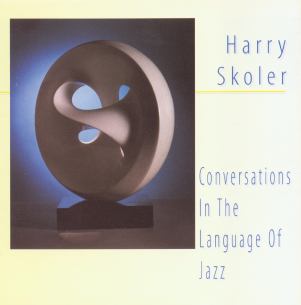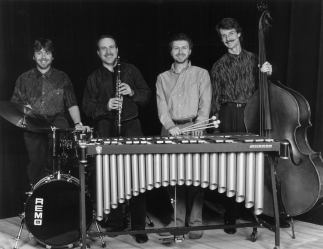
CONVERSATIONS
IN THE
LANGUAGE OF JAZZ
HARRY SKOLER - Clarinet
Available on: 

Harry Skoler performs songs from the swing era, showcasing the music of Benny Goodman, Louis
Armstrong, Duke Ellington and their contemporaries. The instrumentation's unique sound
features clarinet and vibraphone in a quartet setting.
The quartet's distinct arrangements are exacting and delicate. With an emphasis on a lyrical
and fluid approach, the ensemble's style can best be described as 'chamber-like'.

- HARRY SKOLER -- clarinet, sax, piano
- ED SAINDON -- vibraphone, piano
- ROGER KIMBALL -- bass
- TIM GILMORE -- drums
Harry Skoler, born in Syracuse, N.Y in 1956, first heard Benny Goodman's solos played by his teacher Douglas Soyars during a clarinet lesson in 1971. ln Professor Soyar's attempt to introduce Harry to the language of jazz, an old transcription of Goodman's solo from the tune "Grand Slam" was assigned for study. Mostly to appease Soyars, the transcription was practiced, and played at the next lesson in the style of a classical piece (the only style Harry was familiar with). Soyars proceeded to take the clarinet from Harry's hands, and wailed through the transcribed solo like a hot knife through butter. Ears singed from this spiritual awakening, Harry ran to pick up his first Goodman record. After repeated listenings, he told his family that evening that he aspired to be a jazz clarinetist.
Twenty four years have passed since that day in the small basement studio where those first licks introduced Harry to the language of jazz. Schools were attended, careers changed, cities moved to and from, and the addition of saxophone, flute, and piano to his arsenal of voices. However, the voice of the clarinet is still the deepest voice in his heart.
Harry graduated from Berklee College of Music in 1978, having studied with Joe Viola, Andy McGhee, and Greg Badolato. During a three year period in Nashville, Tennessee, he performed with his jazz groups, taught privately, and played in the studio for the first time. ln 1982, he became intrigued with architecture, and decided to study at Syracuse University. Although studying architecture proved interesting and challenging, Harry began to escape from the late night design sessions and participate in local jam sessions. A year later, music was once again the sole pursuit of his life, and with renewed commitment to becoming a jazz musician, he enrolled at New England Conservatory. Here he studied clarinet, saxophone, flute, and composition with the legendary Jimmy Giuffre, and began performing with jazz groups throughout New England.
Harry graduated in 1986 with a Master of Music degree in Jazz Studies. In addition to his quartet, he performs with Adventures With Jazz, educating young people in the language of jazz throughout New England. He has performed with the casts of "Ain't Misbehavin" and "Nunsense', ' and has recorded for television and numerous other projects.
His jazz quartet illuminates Harry's passion for the clarinet, "conversing" with vibraphone, bass and drums. The quartet additionally features Harry on saxophone, flute, and piano, and performs both original music as well as music from the Great American Songbook, and of course. . . the music of Benny Goodman (played and arranged with the quartet's distinct approach).
The clarinet tends to be more a footnote than a specialty for most players of reed instruments on today's jazz scene. Harry Skoler understands its endangered species status in jazz and in his own expressive way is working to reverse it. "The clarinet is a very difficult instrument to stick with in a group, " he explains. "People can step all over it."
That doesn't happen in Skoler's New England based quartet, where the clarinet is his axe of preference though he sometimes doubles on the saxophones, flute and piano. While building his group and finding his sound over the past half dozen years, a special affinity developed between Skoler's clarinetics and the vibraphone playing of Boston jazz veteran Ed Saindon.
Like the flip sides of a coin, like yin and yang, these two instruments were made to be played together While they often share space in larger musical ensembles, rarely have clarinet and vibes been showcased with the empathy heard on this session, including three very fine duets (Memories Of You, I Wish l'd Met You, and Moonglow).
With no short shrift intended for bassist Roger Kimball and drummer Tim Gilmore, who are solid equal partners on this session, the clarinet-vibes pairing grabs the ear because of the special musical combination that is at work. "I noticed that right off the bat when playing with Ed. I've been able to come up with ideas I have never found with anybody else." Skoler says. "We're not always sure who is following whom when we play, but there is always a real melodic affinity."
The music on Skoler's first recording as a leader swings sweetly. At times it is exacting and delicate. There's a cool jazz feel that avoids the roughshod abandon of beboppers even when Harry's playing breaks into an occasional hot sweat
The standards Skoler & Co. offer up here are melodic showcases. Clarinet and vibes are featured from the start on Irving Berlin's classic If l Had You, Skoler's hero Benny Goodman's Stompin' At The Savoy, the three aforementioned duets and several other gems, including Sweet Lorraine, the Bernstein/Sondheim classic Somewhere from West Side Story, and the Gershwins' Soon. We are treated to a duet shift on the Brazilian standard Recado Bossa Nova, which features Skoler's clarinet with Kimball's bass work
Harry shifts to tenor sax, and Ed Saindon to piano, for the classic Johnny Mandel/Peggy Lee tune The Shining Sea, which floats easily over a mood setting Latin beat from Kimball and Gilmore We get a taste of Harry's alto playing on Treasures, an original written for his fiancee, Joanne; his flute work on The Sweetest Sounds; and his piano on Happiness Is, a tasty ballad written by melody master Vince Guaraldi.
The level of empathy among these players comes through clearest on a lesser-known but equally exquisite Johnny Mandel treasure, El Cajon, and on the finale. The latter is an extended solo showcase written by Ed Saindon that has been titled Conversations In The Language Of Jazz. Conversation is the right word. Listen to the interplay within the quartet as Harry gradually works his way up the clarinet's three registers while stretching the melody with his solos.
Harry Skoler has learned his lessons well, particularly mentor Jimmy Giuffre's advice to trust his individuality, to play with clarity, and always use his music to tell a story.
That advice is the essence of these fine conversations.
-Ken Frankling
Ken Franckling, a winner of the ASCAP Deems Taylor award for excellence in music journalism, is a contributing writer and photographer for Downbeat Jazz Times, Swing Journal and many other publications.
IF I HAD YOU Berlin
STOMPIN AT THE SAVOY Goodman/Sampson/Webb
MEMORIES OF YOU Blake/Razaf
THE SHINING SEA Mandel/Lee
SOMEWHERE Bernstein/Sondheim
SWEET LORRAINE Burwell/Parish
THE SWEETEST SOUNDS Rogers
SOON Gershwin/Gershwin
I WISH I'D MET YOU Mandel/Underwood/Bennett
TREASURES Skoler
EL CAJON Mandel/Frishberg
HAPPINESS IS Guaraldi
RECADO BOSSA NOVA Ferriera/Antonio
MOONGLOW Hudson/De Lange/Mills
CONVERSATIONS IN
THE LANGUAGE OF JAZZ Saindon
These mp3 sound files were edited at MacIntyre Music
to give you a feel for the musical range that each song encompasses.
Sound helper applications are available to play back sound on your
system, most of which are either free or shareware.




